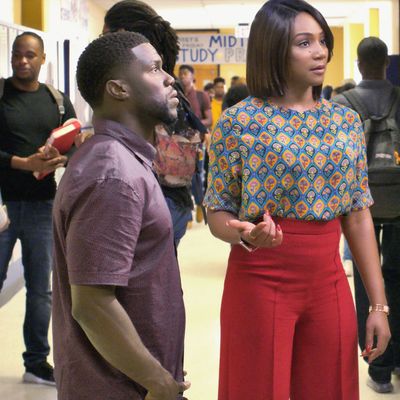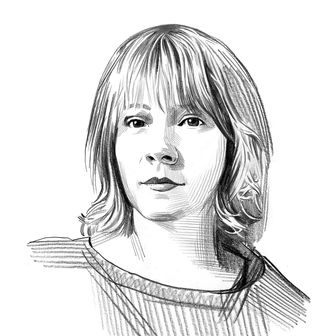
Night School is a half-woke movie. Is it a warm, heartfelt film about overcoming learning disabilities? Kind of. But it also implies that adults with dyslexia need their asses beat in order to learn. (I have dyslexia, dysgraphia, and dyscalculia, all three of which I misspelled in the first draft of this piece, and none of which would be improved with an ass-beating.) Night School passes the Bechdel test, but with only the two white women characters. The black women are still entirely defined by their relationships with men. Even the gay one. I think the girlfriend character has about as many objectifying butt shots as lines. However, there is one thing Night School hits harder than most comedies, and that is its critique of white people’s “black voice.”
Taran Killam plays the principal/antagonist in Night School and has a tendency to slip into what co-stars Kevin Hart and Tiffany Haddish call out as his black voice. He talks about how the school is “mah house,” and how a PTA meeting was “lit.” This is never cute; it is always off-putting. What makes Killam’s black voice interesting is that it’s not an example of him being a goober, but an aspect of his villainy.
A gentleman or lady who is, in the words of Offspring, Pretty Fly for a White Guy (PFWG), has often been the object of ridicule in comedy — but a harmless one. Take the original, non-musical version of The Producers. Bialystock and Bloom hire a hepcat method actor to play Hitler. When he starts using an awkward mishmash of hippie and jazz slang, it makes Hitler less scary and more funny. The play becomes a hit because his slang turns Hitler into wacky fun!
We reached the apotheosis of PFWG with 1998’s Can’t Hardly Wait. Seth Green plays Kenny Fisher, a.k.a. Special K. A FUBU-encrusted poseur, Kenny and his two sidekicks speak in their attempt at AAVE and only listen to rap. They have no black friends and are clearly using the culture to try and shore up a frail masculinity.
Kenny drops the act when he’s trapped in a bathroom with Lauren Ambrose and learns to be emotionally vulnerable. Green’s boys, on the other hand, stay wack. They even drop the N-word around their black classmates and almost get beaten into non-dyslexia. But even those idiots are portrayed as idiots, not racists per se.
Can’t Hardly Wait’s crew was so memorable, they got a corollary in Not Another Teen Movie. In the underrated/problematic film (/early Chris Evans vehicle), Samm Levine plays a guy who leans on Asian stereotypes, with lines like “me so solly” and lots of ancestor talk. Again, this is not portrayed as intentional and hurtful racism, but guileless admiration for another culture.
In real life, cultural appropriation is usually not a 24/7 caricature. (Except Kylie Jenner.) To be conversant in culture as a white person is to be a little appropriative. Style in America is defined by streetwear. Pop music today is EDM, which is just house music done by straight white people. Online vernacular relies heavily on the speech patterns of black women. I couldn’t even explain the muddled political agenda of Night School without using the word “woke,” which I took from black people. Most people take little bits of other cultures, whether you call it appropriation, appreciation, or a natural consequence of being surrounded by people different from you. But the caricatures of PFWGs in film history hide that fact. They use the big, appropriative troll to let us smaller appropriative goblins off the hook. Killam’s brief black voice moments in Night School are notable because they’re more nuanced than that. He slips in and out of the voice, but it’s always fucked up when he does it.


